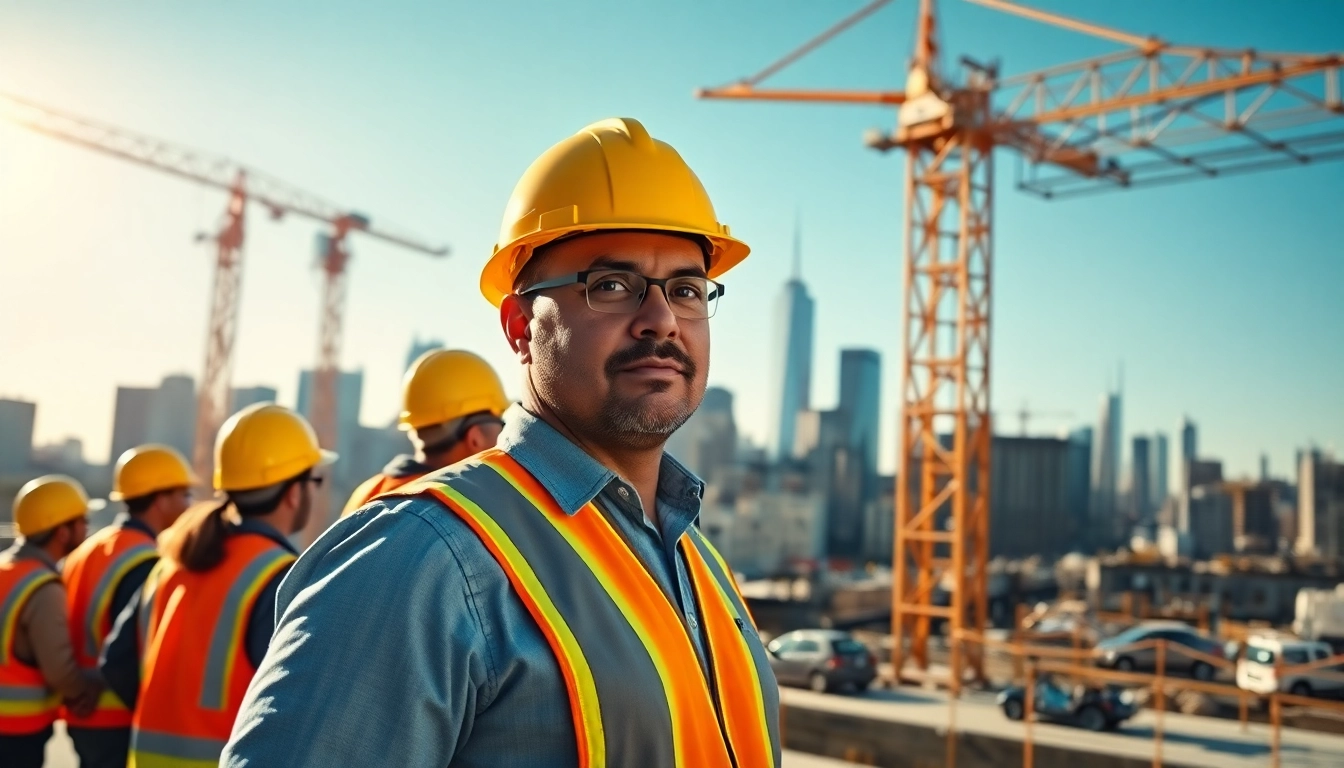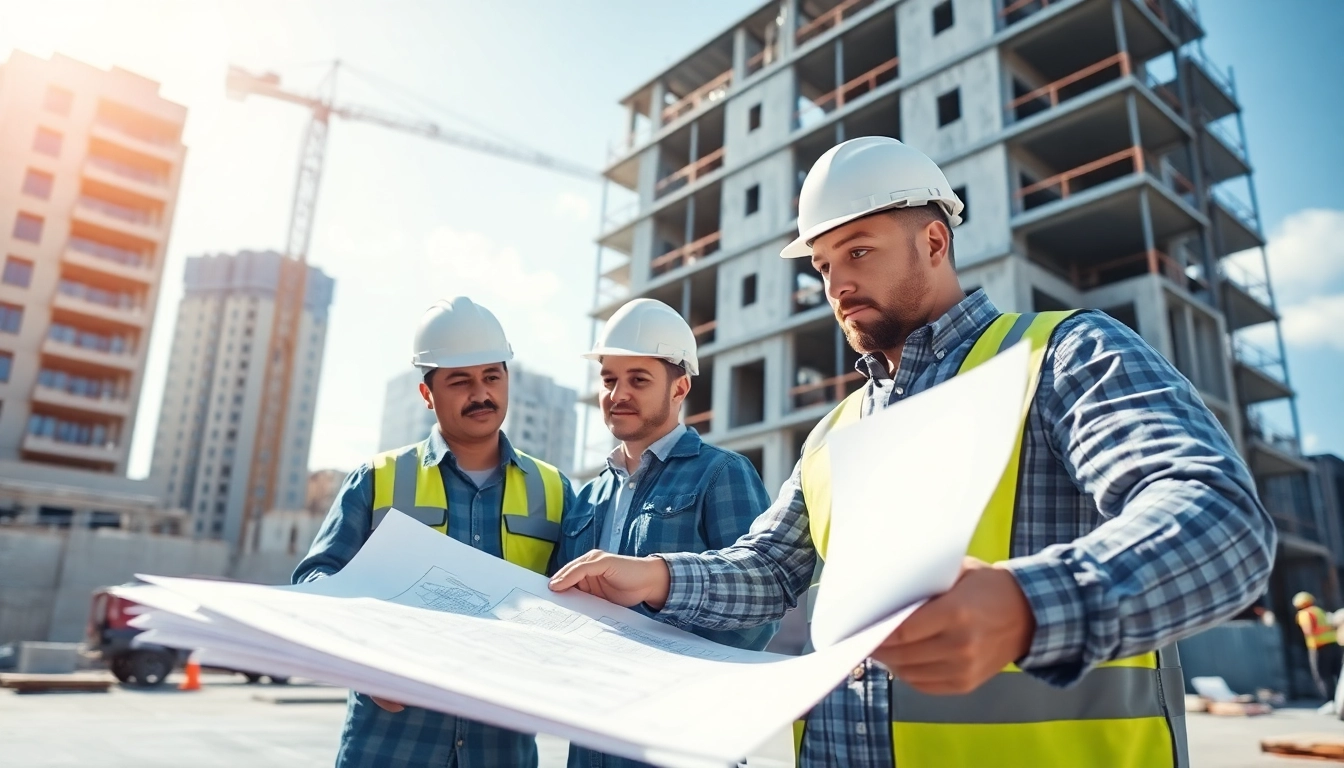
Understanding the Role of a New York City Commercial General Contractor
Definition and Responsibilities
A New York City Commercial General Contractor is a licensed entity responsible for overseeing construction projects from inception to completion. This role involves coordinating various aspects of the construction process, ensuring that projects comply with building codes and regulations, managing schedules, and controlling budgets. Specific responsibilities include hiring subcontractors, procuring materials, securing permits, and ensuring that the work meets the specified standards and quality.
The commercial general contractor acts as the primary point of contact for clients, architects, and engineers, facilitating communication and decision-making throughout the project lifecycle. They are pivotal in translating client visions into physical realities, often adapting plans to minimize costs while maintaining quality.
Key Skills and Qualifications
Success in the role of a commercial general contractor requires a diverse skill set including project management, budgeting, and negotiation skills. These professionals must have a strong understanding of construction methodologies, regulations, and safety practices. Below are some critical skills and qualifications:
- Project Management: The ability to oversee multiple projects simultaneously while ensuring they stay on schedule and within budget.
- Financial Acumen: A solid grasp of budgeting, cost estimation, and overall financial management relevant to construction.
- Technical Knowledge: Understanding engineering and architectural principles to effectively manage construction plans and procedures.
- Problem-Solving Skills: The ability to quickly address and resolve issues that arise during construction.
- Communication Skills: Strong interpersonal abilities to liaise between clients, workers, and external stakeholders.
The Importance of Local Expertise
Working in New York City presents unique challenges and opportunities, making local expertise indispensable. A contractor familiar with NYC’s specific zoning laws, building codes, and permitting processes can navigate these complexities more effectively than an outsider. Local contractors also have established relationships with suppliers, subcontractors, and city officials, which can expedite the approval processes and procurement of materials. Additionally, understanding local market trends allows contractors to provide more accurate cost estimates and timelines, thereby enhancing project outcomes.
How to Find the Right New York City Commercial General Contractor
Researching Licensed Contractors
Finding a reliable commercial general contractor starts with researching licensed professionals. In New York City, all general contractors must be licensed, ensuring they meet the necessary qualification standards. Potential clients should check the New York City Department of Buildings website or other licensing boards to verify a contractor’s license and track record. This step is crucial for avoiding disputes and ensuring project integrity.
Evaluating Previous Projects
When assessing potential contractors, reviewing their portfolio of past projects can provide invaluable insights into their capabilities. Clients should look for contractors who have experience in similar projects, especially within their specific industry. Evaluating completed projects in terms of quality, budget adherence, and timelines can highlight a contractor’s strengths and weaknesses. Consider requesting case studies or project summaries that detail challenges faced and how they were overcome.
Reading Client Testimonials
Client testimonials and references play a crucial role in evaluating a contractor’s reliability. Engaging with previous clients can provide firsthand accounts of the contractor’s work ethic, professionalism, and ability to deliver on promises. Look for reviews that highlight the contractor’s communication and responsiveness, as these factors are often indicative of a smooth project experience.
Factors Affecting Cost in Commercial Contracting
Common Cost Components
Understanding the various components that influence the cost of commercial contracting is essential for budget planning. Key cost components often include:
- Labor Costs: Wages for workers, including specialized subcontractors, are often a significant portion of project expenses.
- Material Costs: Prices for construction materials can fluctuate based on market demand and supplier contracts.
- Equipment Rental: Rental costs for heavy machinery and specialized tools needed for construction.
- Permitting and Fees: Costs associated with obtaining the necessary building permits and compliance fees.
- Insurance and Bonds: Expenses related to obtaining liability insurance or performance bonds for the project.
How Location Influences Pricing
Location within New York City can significantly impact construction costs. Variations in land value, labor market conditions, and the proximity of suppliers can either inflate or reduce expenses. Additionally, different neighborhoods may have unique zoning laws or regulations that can affect project planning and costs. For example, building in a highly desirable area may require more extensive permits or adherence to stricter regulations, leading to higher expenses.
Negotiating Terms and Pricing
Effective negotiation is a critical skill for securing favorable terms in commercial contracting. Clients should approach negotiations armed with data and a clear understanding of project scope and requirements. Establishing transparent communication with potential contractors can facilitate discussions around costs, timelines, and other project parameters. It is also advisable to obtain multiple quotes from different contractors to ensure competitive pricing.
Best Practices for Working with a New York City Commercial General Contractor
Effective Communication Strategies
Effective communication with a commercial general contractor is vital to the success of any construction project. Engaging in regular updates, whether through weekly meetings or progress reports, helps ensure all parties are aligned. Use project management tools and apps to facilitate communication, documentation, and feedback, which can streamline the flow of information and reduce misunderstandings.
Setting Expectations and Timelines
Establishing clear expectations from the outset is crucial. Clients should communicate their vision, goals, and any potential constraints openly with the contractor. Agreeing on a detailed timeline with milestones allows both parties to gauge progress and adjust plans as needed. Setting expectations regarding quality and deadlines ensures accountability, paving the way for a successful project outcome.
Monitoring Progress and Quality
Clients should keep a close watch on the progression of the project by monitoring key performance metrics, including timelines and quality standards. Regular site visits and open dialogues with the contractor on any arising issues allow clients to intervene early if problems arise. Requesting periodic updates or photo documentation can also help keep track of progress and quality, ensuring that the project is moving in the right direction.
Future Trends in New York City Commercial Contracting
Technology’s Impact on Construction
Technology is rapidly transforming the construction landscape, with tools like Building Information Modeling (BIM) and project management software enhancing efficiency and collaboration. These technologies facilitate precise planning, improve communication, and allow for better visualization of projects before construction begins. Furthermore, the adoption of drones for site surveys and monitoring is on the rise, providing contractors with real-time data and imagery to inform project decisions.
Sustainable Practices in Urban Development
As sustainability becomes increasingly important, New York City commercial contractors are adopting green building practices. This includes utilizing energy-efficient materials, reducing waste through recycling efforts, and designing buildings with sustainability in mind. These practices not only address environmental concerns but can also yield long-term operational savings and appeal to modern businesses focused on social responsibility.
Changing Regulations and Compliance
Staying abreast of changes in regulations and compliance required for commercial construction projects is essential. As NYC continues to evolve, its building codes and industry regulations are routinely updated. Contractors must remain informed about these changes to ensure compliance and avoid legal complications. Participating in industry workshops and collaborating with legal experts can provide valuable insights into navigating these complexities.




